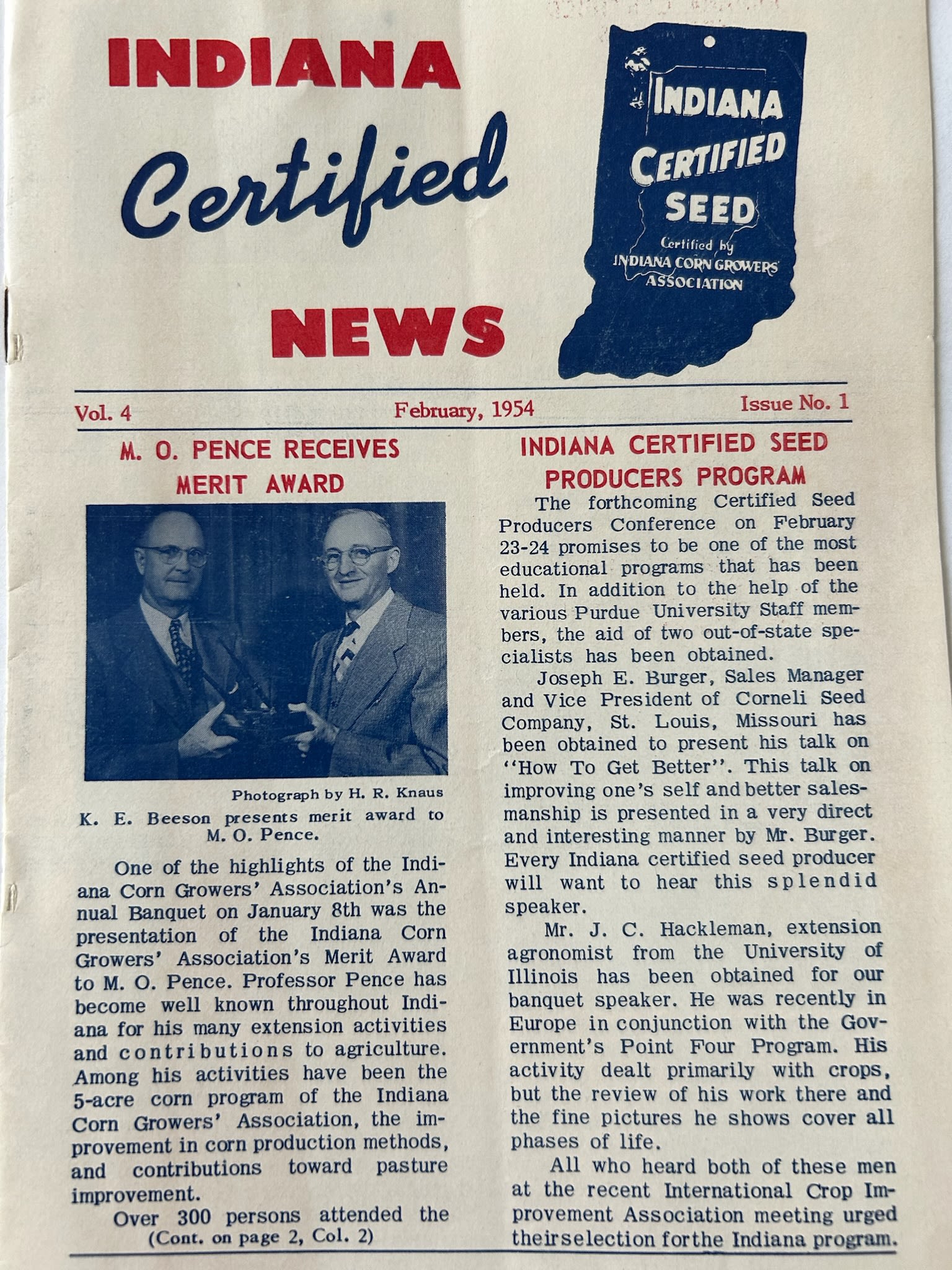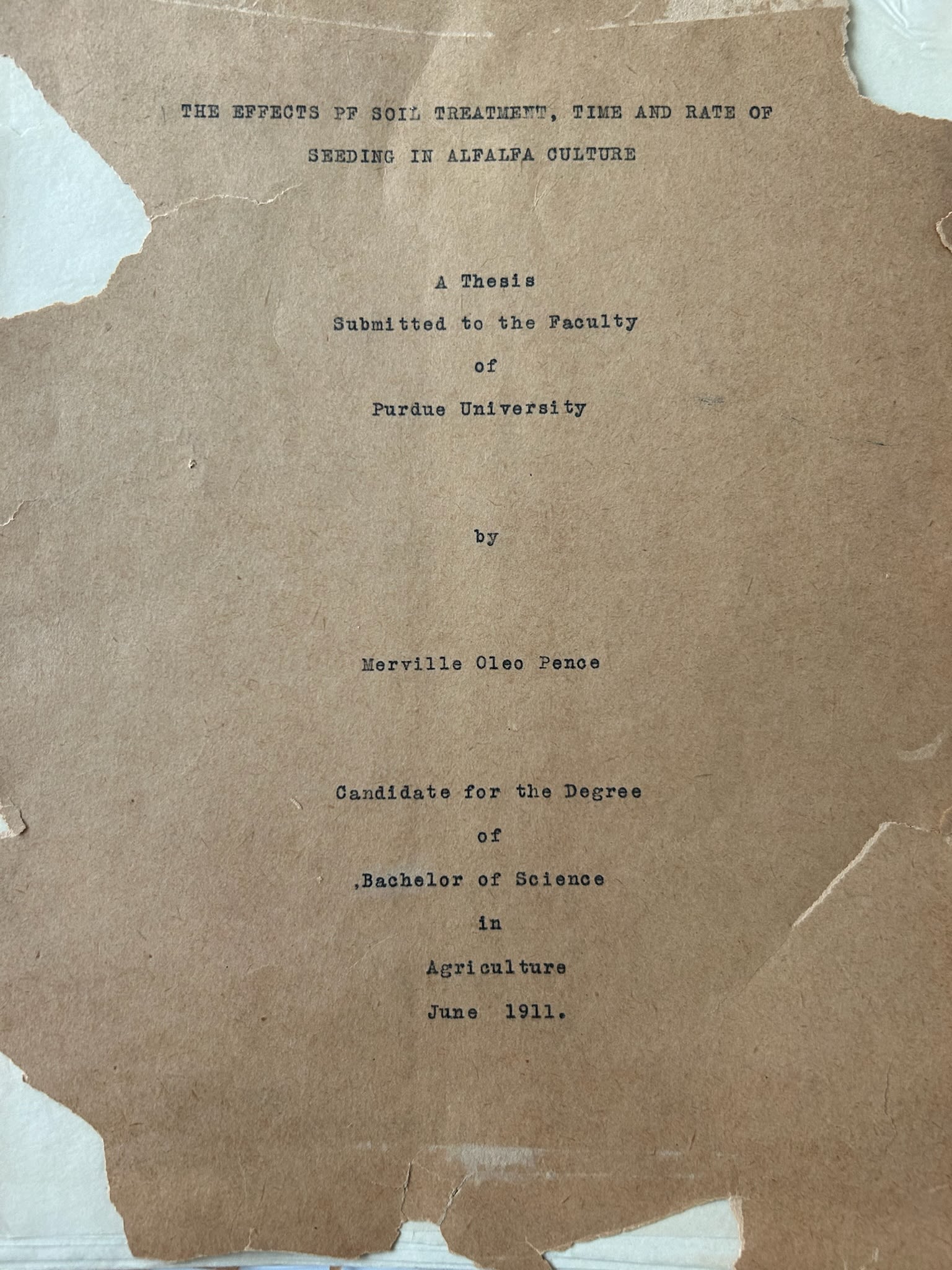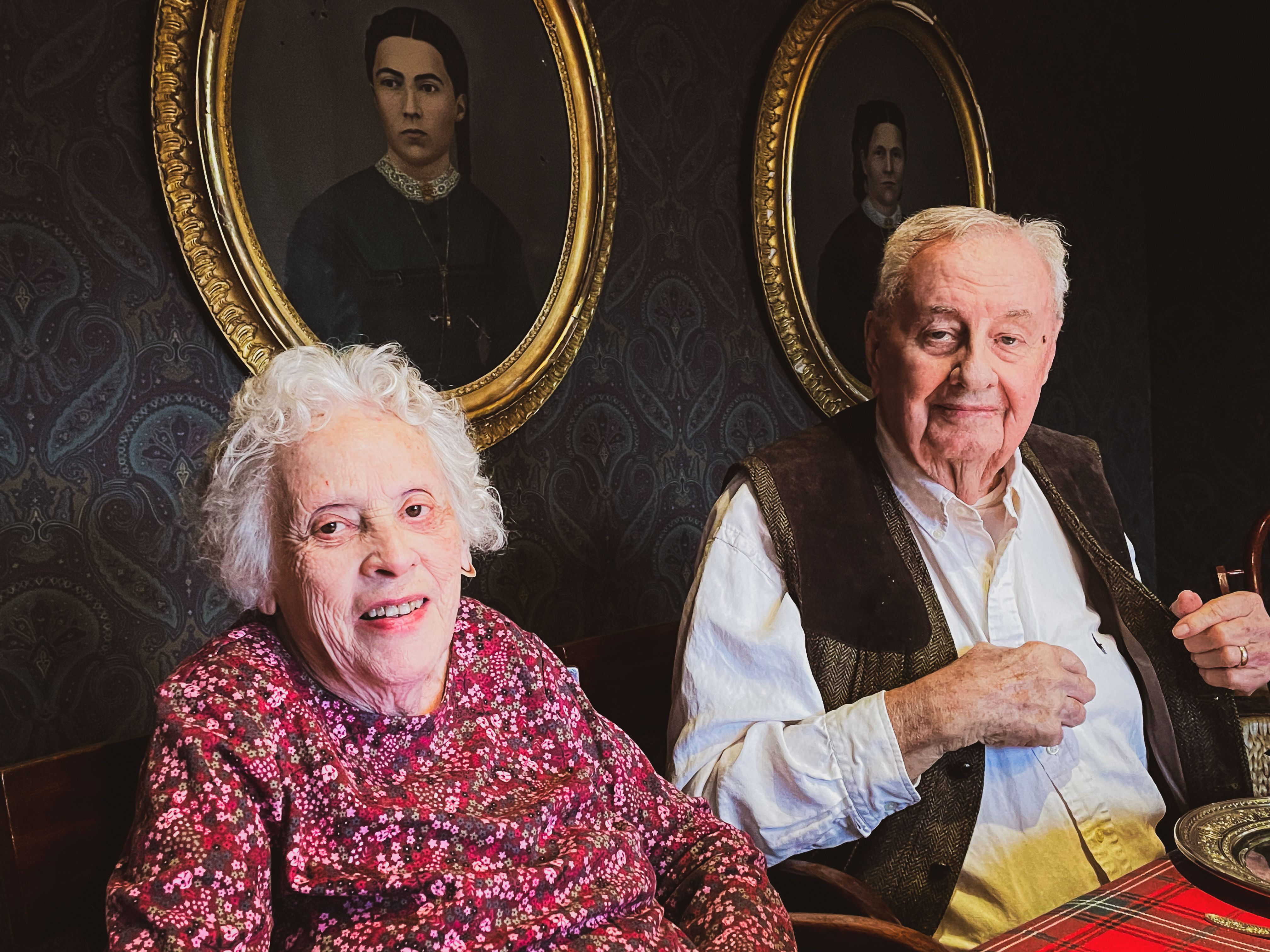ROOTED IN PURDUE
// By Kat Braz (LA’01, MS LA’19)
// Photos by Charles Jischke (MBA’08)
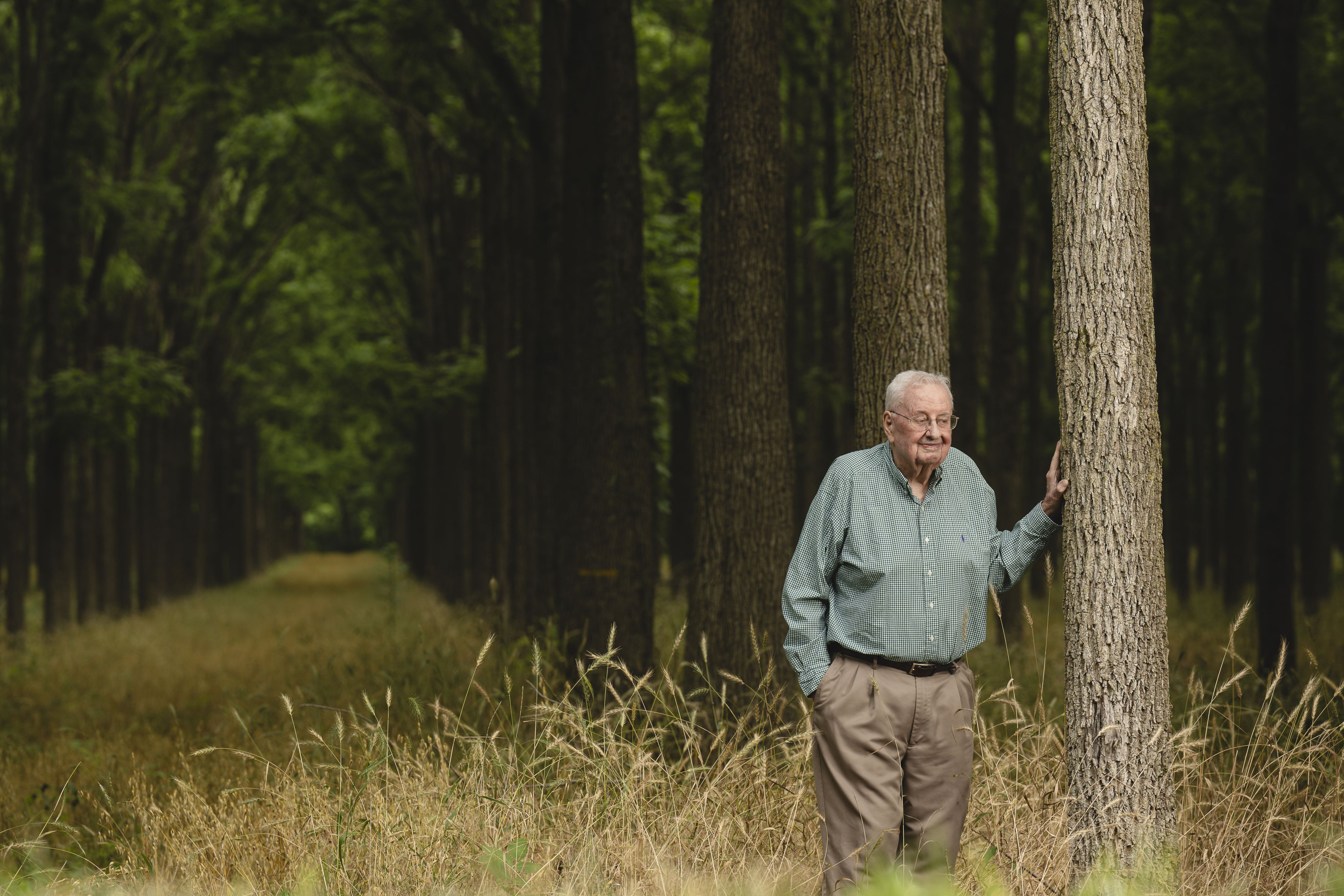
“I bought my first farm in 1963. I planted my first trees on that farm in 1966, and I’ve been planting trees every year since.”

Hugh Pence can teach you just about anything you want to learn about walnut trees.
A longtime member and past president of the national Walnut Council, Hugh (A’54, MS A’58) is a recognized expert in both soil and timber management.
In 1989, Hugh and his wife, Judy (Marshall) Pence (LA’54), began operating the Pence Legacy walnut plantation along the Wildcat Creek near Lafayette.
At the time, it was the largest agroforestry project in the country, where rows of trees were planted with space for farming corn and soybeans in between. Of the 44,000 walnut seedlings planted, about 11,000 black walnut trees remain. The Pences carefully managed their walnut stands, thinning the poorest quality trees over the years, selecting for growth, straightness, trunk diameter, and other characteristics.
“We’ll be harvesting those trees in another 35 years or so,” Hugh says as he surveys the walnut plantation on a balmy summer evening.
At age 92, Hugh knows he won’t be the one who reaps the rewards from the fields of timber. He’s known that all along. When he and Judy invested in Pence Legacy 35 years ago, they were doing so with the intent of benefiting their grandchildren—before some of them had even been born.
A second-generation Purdue agriculturist and third-generation farmer, Hugh has always approached farm management from a long-range perspective, just as his father and grandfather did before him. He inherited their strong work ethic, too. Now at an age well past the point when most people are retired, Hugh still actively manages family farms. He loves sharing his expertise with others—especially Purdue forestry students—and he’s still planting trees.
“I bought my first farm in 1963,” Hugh says. “I planted my first trees on that farm in 1966, and I’ve been planting trees every year since.”
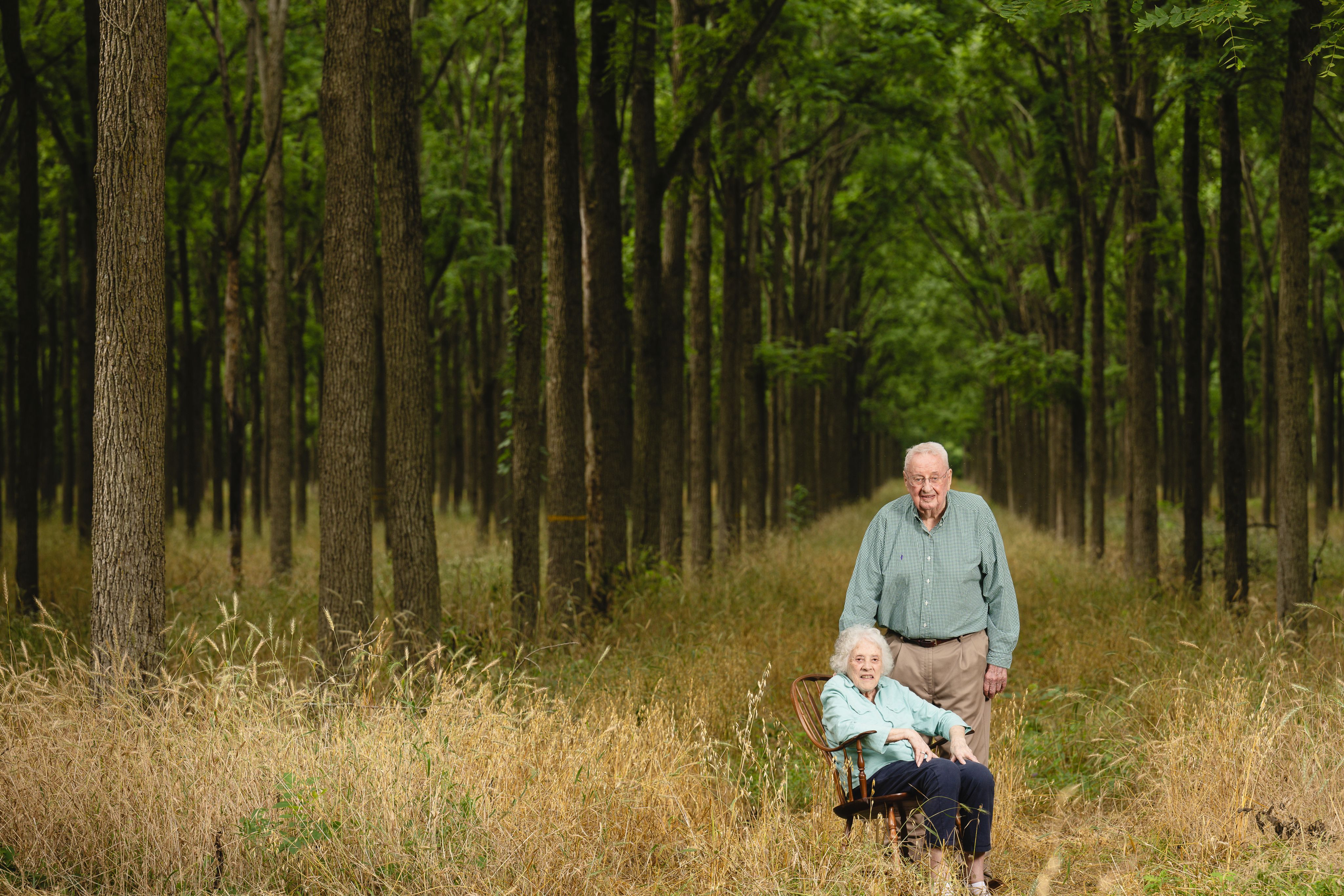
Hugh Pence can teach you just about anything you want to learn about walnut trees.
A longtime member and past president of the national Walnut Council, Hugh (A’54, MS A’58) is a recognized expert in both soil and timber management.
In 1989, Hugh and his wife, Judy (Marshall) Pence (LA’54), began operating the Pence Legacy walnut plantation along the Wildcat Creek near Lafayette.
At the time, it was the largest agroforestry project in the country, where rows of trees were planted with space for farming corn and soybeans in between. Of the 44,000 walnut seedlings planted, about 11,000 black walnut trees remain. The Pences carefully managed their walnut stands, thinning the poorest quality trees over the years, selecting for growth, straightness, trunk diameter, and other characteristics.
“We’ll be harvesting those trees in another 35 years or so,” Hugh says as he surveys the walnut plantation on a balmy summer evening.
At age 92, Hugh knows he won’t be the one who reaps the rewards from the fields of timber. He’s known that all along. When he and Judy invested in Pence Legacy 35 years ago, they were doing so with the intent of benefiting their grandchildren—before some of them had even been born.
A second-generation Purdue agriculturist and third-generation farmer, Hugh has always approached farm management from a long-range perspective, just as his father and grandfather did before him. He inherited their strong work ethic, too. Now at an age well past the point when most people are retired, Hugh still actively manages family farms. He loves sharing his expertise with others—especially Purdue forestry students—and he’s still planting trees.
“I bought my first farm in 1963,” Hugh says. “I planted my first trees on that farm in 1966, and I’ve been planting trees every year since.”

An Early Love of Ag
Hugh’s father, M.O. Pence (A’1911), was raised on a farm in Grant County, Indiana, and served as an extension agronomist at Purdue from 1922 until his retirement from the university in 1957. M.O. was a pasture specialist whose contributions to crop improvement led to dramatically increased yields.
In 2007, M.O. was named a Purdue Legend of Agronomy. The M.O. Pence Memorial Scholarship, established by the Pence family, is presented annually to top agronomy students, recognizing outstanding performance in leadership and a commitment to applied research and extension.
M.O. and his wife, Florence, raised their family in a bungalow on the corner of Salisbury and Dehart Streets in West Lafayette.
Although Hugh grew up a city kid, his love for agriculture started young. In addition to visiting his grandfather’s farm, Hugh remembers boarding the bus at age 13 and riding until the end of the line to get off at the university’s soils and crops experiment farm. The precursor to the Purdue Agronomy Farm was located on the eastern edge of Lafayette near the present-day intersection of Sagamore Parkway and South Street.
“I hoed soybeans for 35 cents an hour,” Hugh says. “I worked there several summers. I’ve got work in my blood. My parents always told me that when I was in fourth grade, I said I wanted to be a farm manager. I don’t know whether that’s true or not, but I knew I wanted to work in agriculture.”


An Early Love of Ag
Hugh’s father, M.O. Pence (A’1911), was raised on a farm in Grant County, Indiana, and served as an extension agronomist at Purdue from 1922 until his retirement from the university in 1957. M.O. was a pasture specialist whose contributions to crop improvement led to dramatically increased yields.
In 2007, M.O. was named a Purdue Legend of Agronomy. The M.O. Pence Memorial Scholarship, established by the Pence family, is presented annually to top agronomy students, recognizing outstanding performance in leadership and a commitment to applied research and extension.
M.O. and his wife, Florence, raised their family in a bungalow on the corner of Salisbury and Dehart Streets in West Lafayette.
Although Hugh grew up a city kid, his love for agriculture started young. In addition to visiting his grandfather’s farm, Hugh remembers boarding the bus at age 13 and riding until the end of the line to get off at the university’s soils and crops experiment farm. The precursor to the Purdue Agronomy Farm was located on the eastern edge of Lafayette near the present-day intersection of Sagamore Parkway and South Street.
“I hoed soybeans for 35 cents an hour,” Hugh says. “I worked there several summers. I’ve got work in my blood. My parents always told me that when I was in fourth grade, I said I wanted to be a farm manager. I don’t know whether that’s true or not, but I knew I wanted to work in agriculture.”

A Right-Hand Woman
Although Judy and Hugh first met in kindergarten at Morton School, it wasn’t until their senior year of high school that the couple started dating.
Judy’s father, R.B. Marshall (ECE’1923, MS ECE’44), was a Purdue electrical engineering professor for 22 years.
Judy’s mother, Margaret (Brown) Marshall (S’1922), majored in home economics and was a founding member of Purdue’s chapter of Chi Omega in 1919. She stayed involved with the sorority throughout her life, including a stint as president of the corporation board. Later, Judy would go on to pledge Chi Omega and, over a span of 50 years, serve as an advisor and corporation treasurer.
Judy grew up in a home once owned by Purdue president Winthrop Stone at 146 North Grant Street, now the site of the Grant Street Garage. Her entrepreneurial dad also ran a boarding house during World War II. R.B. paid Judy and her two sisters three-sixteenths of a cent per bedsheets changed, teaching fractions to figure their allowance.
By all accounts, R.B. was a discerning and exacting man, but he approved of Hugh.
“One night in college, we were going on a date, and Dad said, ‘I want to talk to you kids when you get back,’” Judy says. “We went for supper somewhere, and when we came back to the house, Dad said, ‘I think you ought to get married.’ I threw myself on the floor because it shocked me so much.”
They were married in 1953 while still Purdue students. After graduation, Hugh served in the Army for two years before returning to West Lafayette for his master’s degree.
“About 10 days before graduation, an ag econ professor told me that Halderman Farm Management needed a farm manager,” Hugh says. “Judy and I drove to Wabash on a Friday for the interview. The guy called me back Saturday morning to tell me I was hired. That was the only interview I ever had.”
At the height of his career, Hugh managed more than 50 farms in Indiana and Illinois. The Pences purchased their own farms, too. They also managed around 40 apartments, a business they learned from Judy’s dad. While Hugh bought seed, hired workers, and made repairs, Judy answered calls, kept paperwork organized, balanced the books, and documented everything—typing 100 words per minute.
“We’ve worked side by side our entire lives,” Hugh says.
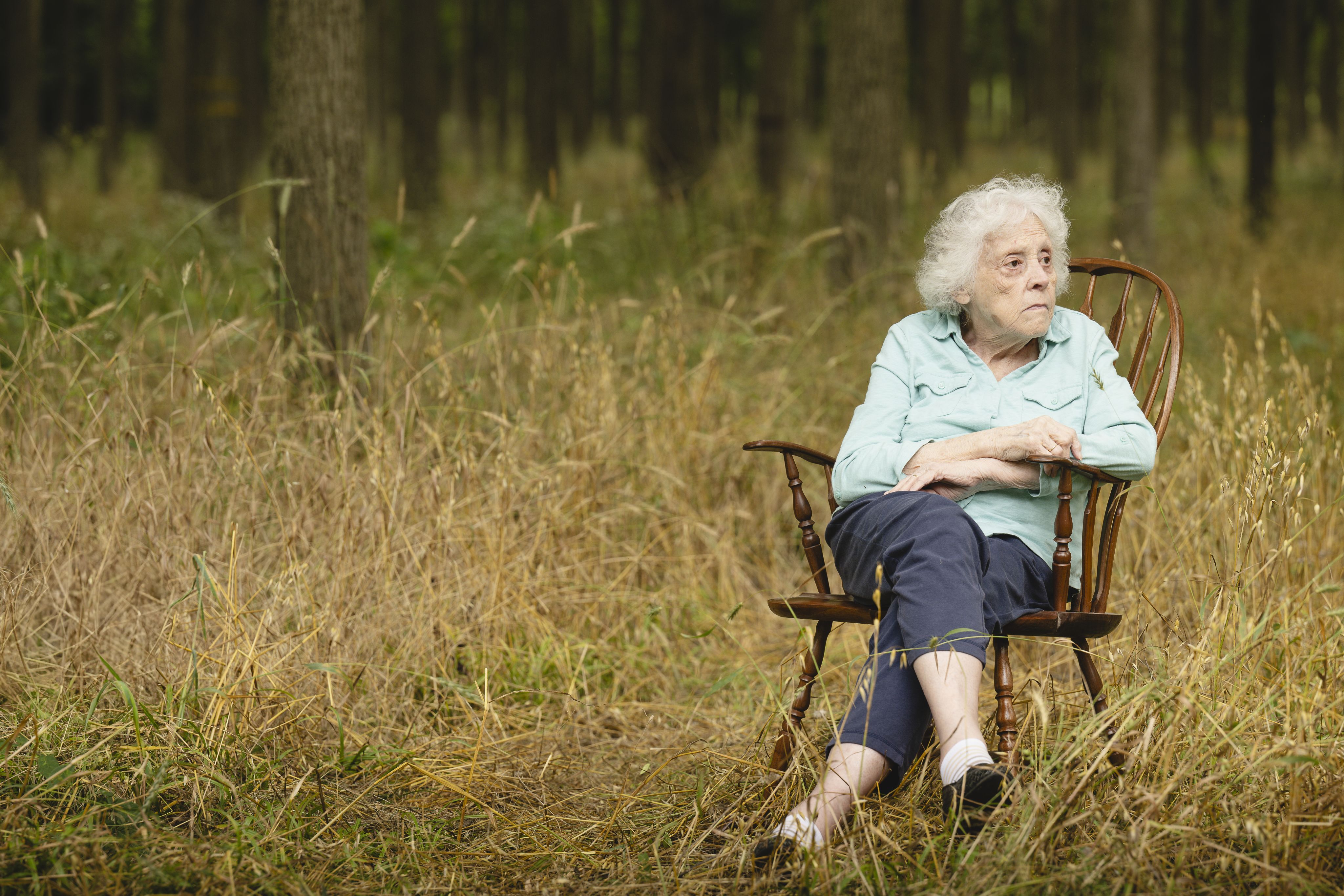
A Right-Hand Woman
Although Judy and Hugh first met in kindergarten at Morton School, it wasn’t until their senior year of high school that the couple started dating.
Judy’s father, R.B. Marshall (ECE’1923, MS ECE’44), was a Purdue electrical engineering professor for 22 years.
Judy’s mother, Margaret (Brown) Marshall (S’1922), majored in home economics and was a founding member of Purdue’s chapter of Chi Omega in 1919. She stayed involved with the sorority throughout her life, including a stint as president of the corporation board. Later, Judy would go on to pledge Chi Omega and, over a span of 50 years, serve as an advisor and corporation treasurer.
Judy grew up in a home once owned by Purdue president Winthrop Stone at 146 North Grant Street, now the site of the Grant Street Garage. Her entrepreneurial dad also ran a boarding house during World War II. R.B. paid Judy and her two sisters three-sixteenths of a cent per bedsheets changed, teaching fractions to figure their allowance.
By all accounts, R.B. was a discerning and exacting man, but he approved of Hugh.
“One night in college, we were going on a date, and Dad said, ‘I want to talk to you kids when you get back,’” Judy says. “We went for supper somewhere, and when we came back to the house, Dad said, ‘I think you ought to get married.’ I threw myself on the floor because it shocked me so much.”
They were married in 1953 while still Purdue students. After graduation, Hugh served in the Army for two years before returning to West Lafayette for his master’s degree.
“About 10 days before graduation, an ag econ professor told me that Halderman Farm Management needed a farm manager,” Hugh says. “Judy and I drove to Wabash on a Friday for the interview. The guy called me back Saturday morning to tell me I was hired. That was the only interview I ever had.”
At the height of his career, Hugh managed more than 50 farms in Indiana and Illinois. The Pences purchased their own farms, too. They also managed around 40 apartments, a business they learned from Judy’s dad. While Hugh bought seed, hired workers, and made repairs, Judy answered calls, kept paperwork organized, balanced the books, and documented everything—typing 100 words per minute.
“We’ve worked side by side our entire lives,” Hugh says.

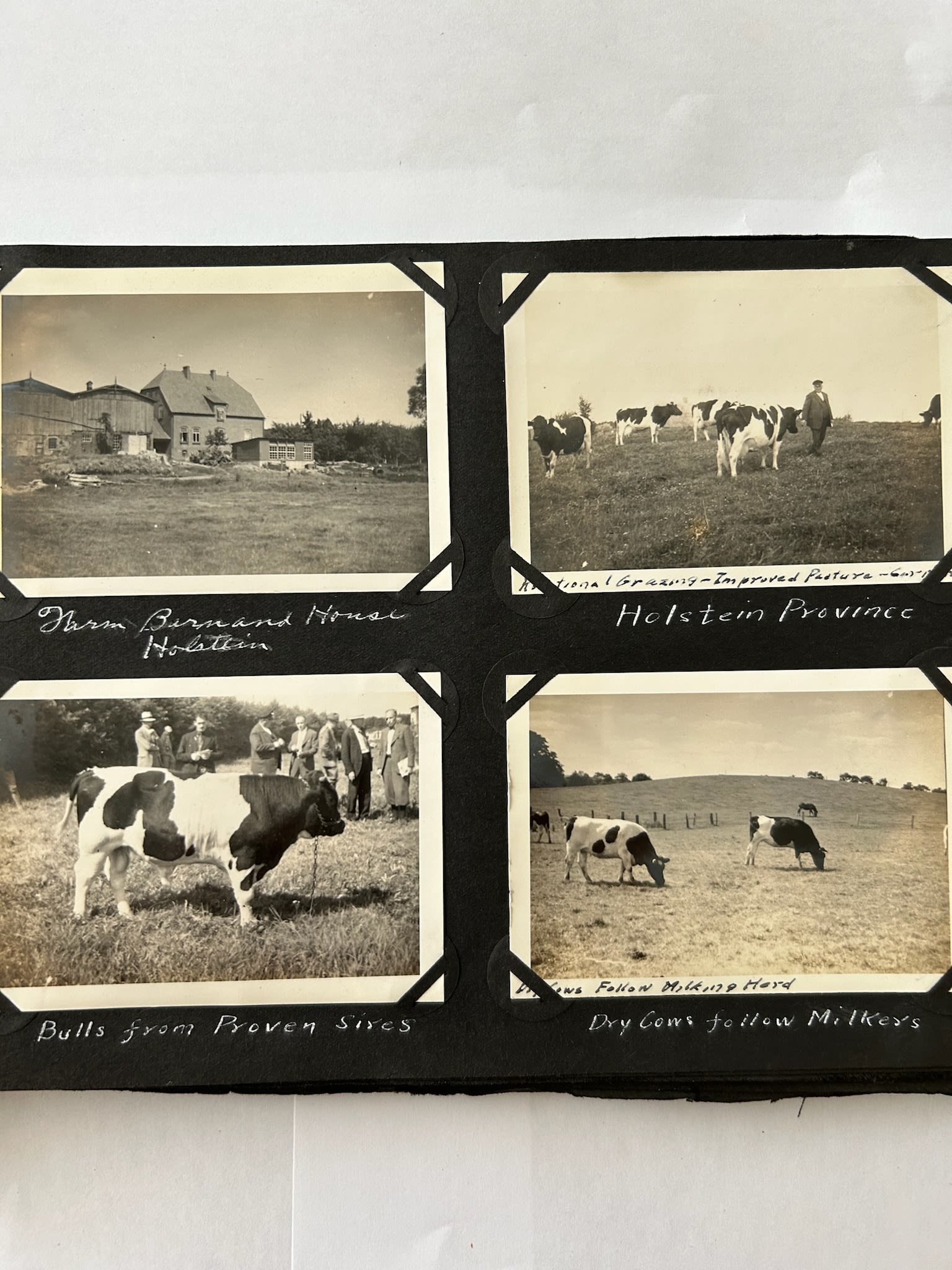
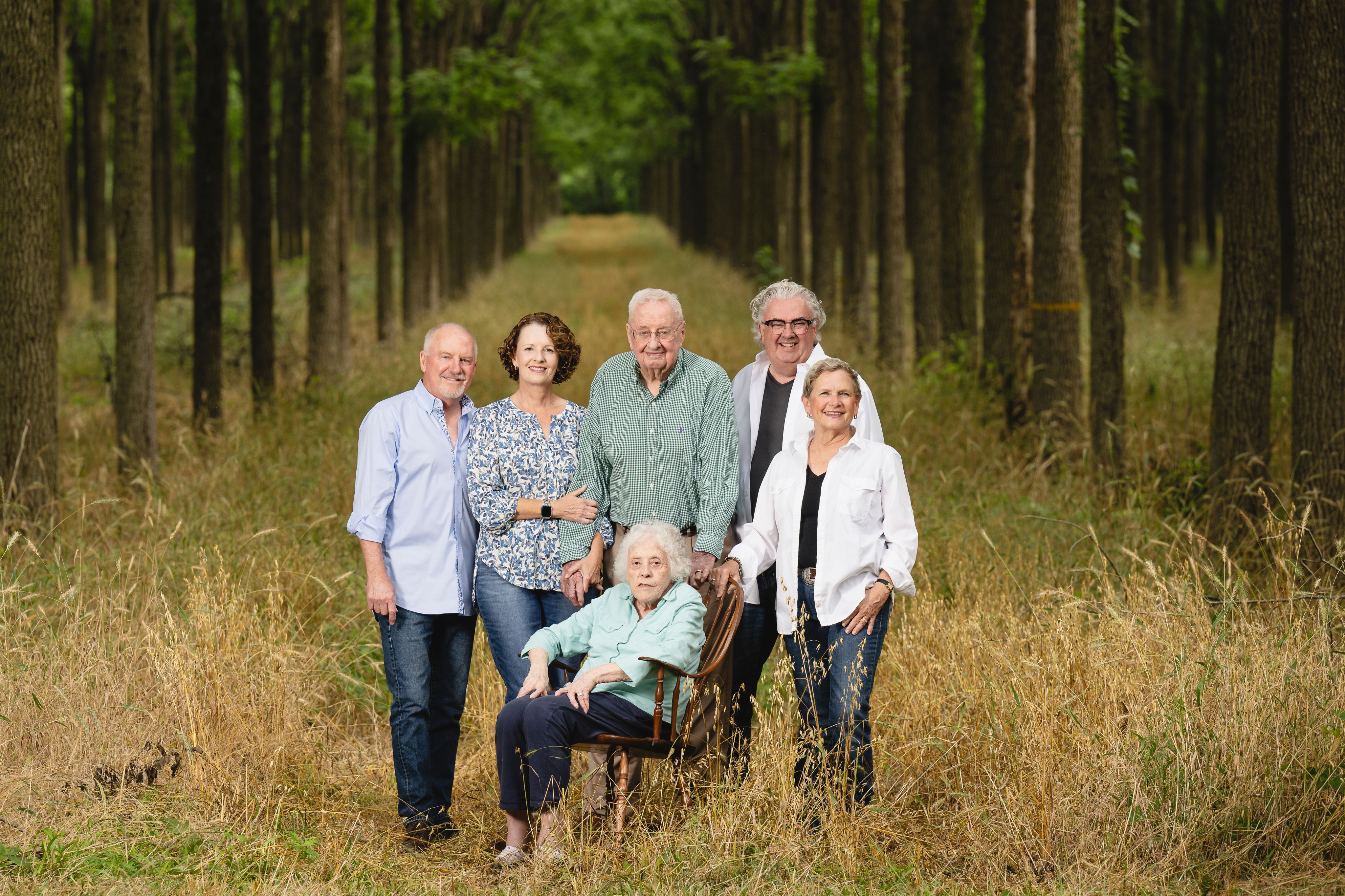
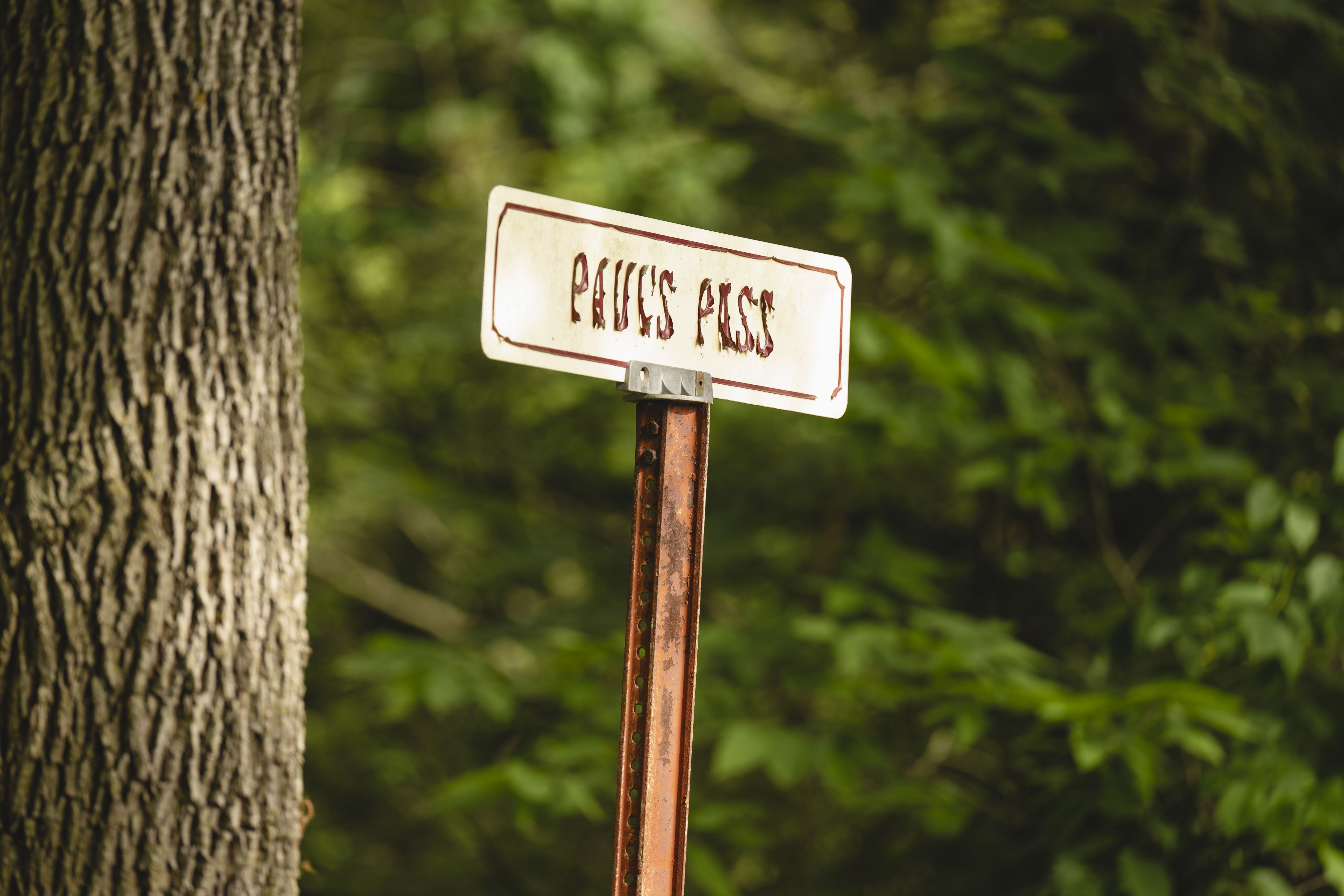
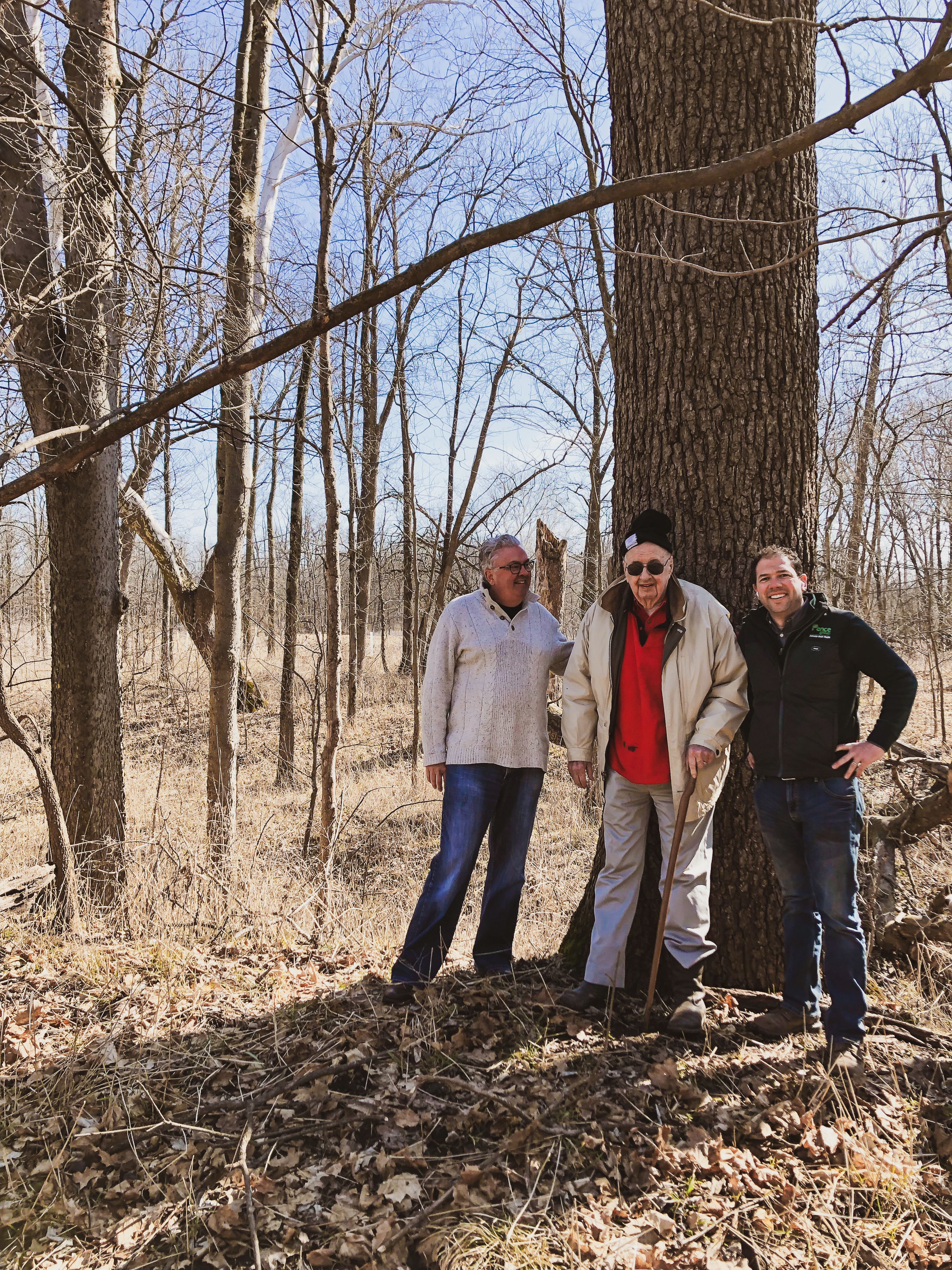
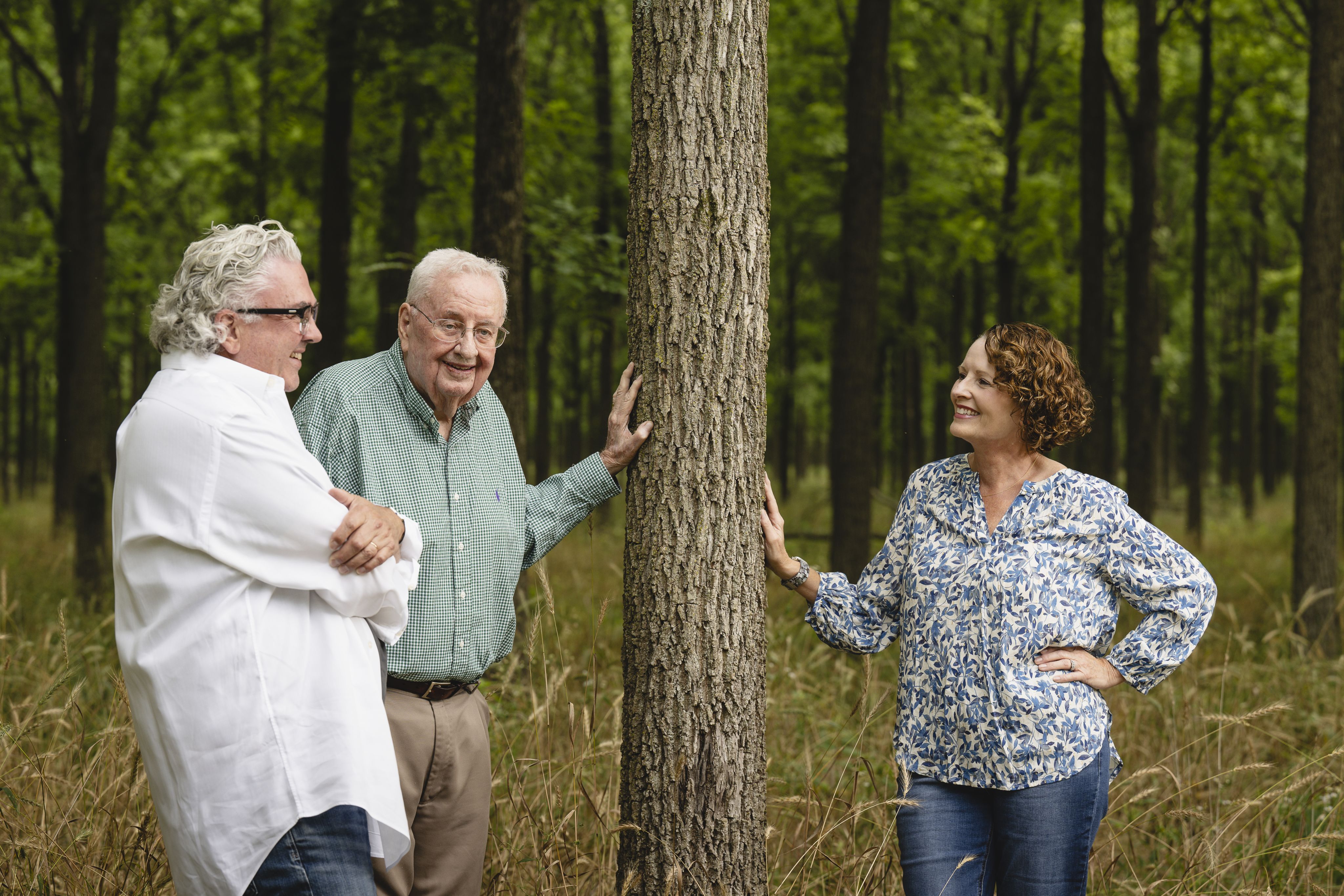
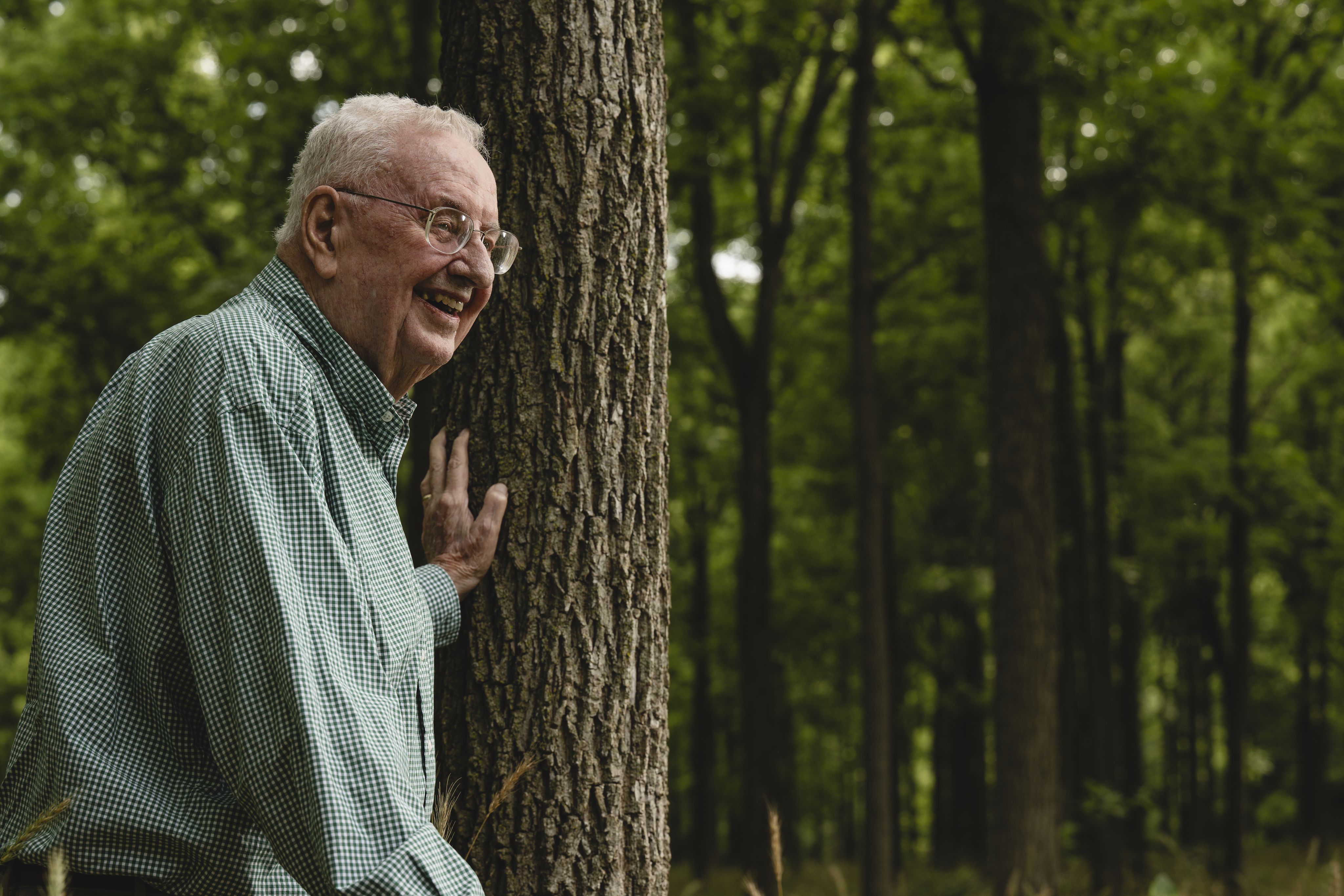
A Boilermaker Legacy
Hugh and Judy’s two children earned degrees from Purdue and both married fellow Purdue graduates.
Jeff Pence (ME’81, MBA’85) is COO of Farm Journal, an agriculture data and media company.
After a 33-year career in banking, Julie (Pence) Minner (M’86)—a third-generation Chi Omega—now manages several of the family farms—learning the ins and outs of agronomy from her dad.
From left: Jeff Minner (LA’83), Julie (Pence) Minner, Hugh Pence, Judy Pence, Jeff Pence, and Corinne (Koehler) Pence (M’77, MS M’77)
With a bit more time on his hands, Hugh cultivated his interest in free market economics, and he and Judy established an endowment in the Purdue University Research Center in Economics.
He remains involved in the Walnut Council, hosting occasional meetings at the plantation, and he’s still doling out advice on agronomy, trees, business, or economics to anyone ready to listen.
His No. 1 tip for achieving success in agribusiness?
“Take care of the land, and the land will take care of you.”
A Boilermaker Legacy
Hugh and Judy’s two children earned degrees from Purdue and both married fellow Purdue graduates.
Jeff Pence (ME’81, MBA’85) is COO of Farm Journal, an agriculture data and media company.
After a 33-year career in banking, Julie (Pence) Minner (M’86)—a third-generation Chi Omega—now manages several of the family farms—learning the ins and outs of agronomy from her dad.
From left: Jeff Minner (LA’83), Julie (Pence) Minner, Hugh Pence, Judy Pence, Jeff Pence, and Corinne (Koehler) Pence (M’77, MS M’77)


With a bit more time on his hands, Hugh cultivated his interest in free market economics, and he and Judy established an endowment in the Purdue University Research Center in Economics.
He remains involved in the Walnut Council, hosting occasional meetings at the plantation, and he’s still doling out advice on agronomy, trees, business, or economics to anyone ready to listen.

His No. 1 tip for achieving success in agribusiness?
“Take care of the land, and the land will take care of you.”

